Services
Home » Services
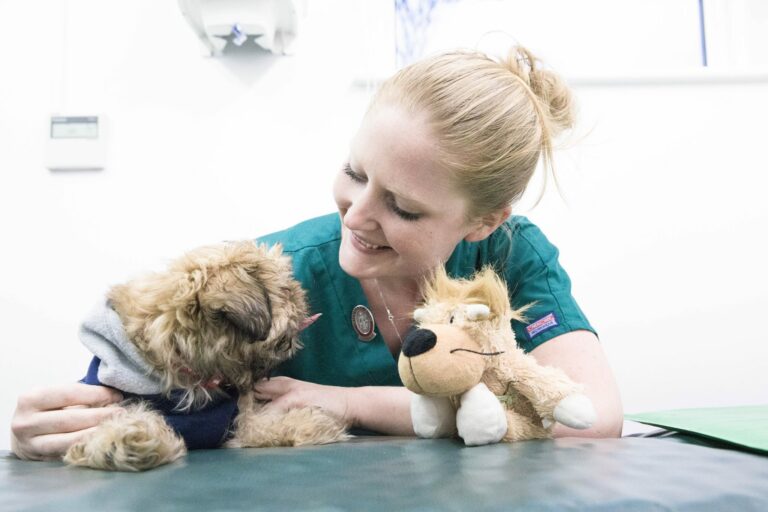
Veterinary Services
We are trusted by over 10,000 pet owners in the Gravesend and North Kent area.
We are open to see your pet if you are concerned, 7 days a week 365 days a year. In addition to our cat and dog clients, we also see most small exotic species, including birds and reptiles. Visit us at a convenient time – we are open on Sunday mornings and until 6.30pm most evenings for routine appointments.
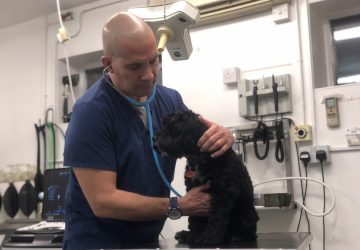
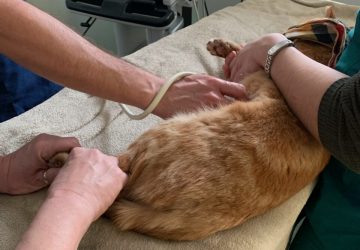
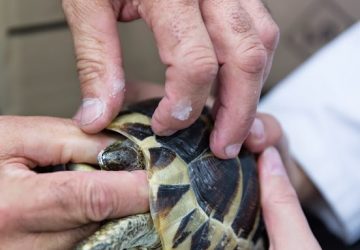
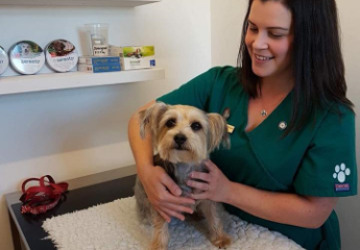
What do we do?
Our specially qualified vets can offer acupuncture treatment for your pet
Does your pet suffer from a chronic condition like arthritis, or a persistent skin condition? Perhaps they don’t respond to conventional medication? Or maybe you’re looking for a natural treatment that doesn’t involve drugs and prescriptions?
Have you ever considered acupuncture for your pet?
Acupuncture is a traditional method of Eastern medicine which has been used to successfully treat pain and other conditions for thousands of years. It involves inserting tiny needles into particular acupressure points on the body, which work to unblock energy channels and relieve symptoms.
At The Shrubbery, our Clinical Director Natalie Devleeschouwer is additionally trained to carry out acupuncture treatment. The first appointment will involve taking a full medical and behavioural history from you about your pet, followed by the treatment itself. All subsequent consultations will be around 30 minutes long.
What is Acupuncture?
Acupuncture is a technique where specific needles are inserted into specific points on the body to produce a healing response, such as relieving pain and other therapeutic purposes. Acupuncture originated from China and now is used in conjunction with Western medicine. Scientific research has made enormous progress over the past 40 years and now explains some of acupuncture’s actions. Early research focused mainly on pain and the release of pain-killing chemicals from the brain in response to acupuncture. However, further investigations have revealed more widespread effects involving neuro- hormones and the autonomic (involuntary) nervous system.
Which species can benefit from acupuncture?
Acupuncture is widely used in dogs and cats, but can be beneficial in birds and rabbits too.
For Which conditions can Acupuncture be used?
- Back pain
- Arthritis
- Hip dysplasia
- Muscle and ligament injury
- Paralysis/Paresis
- Chronic skin conditions (specially lick granuloma)
- It can also help any chronic pain which is not being controlled by conventional treatments, or when a pet is suffering from side effects.
For more information about the benefits of acupuncture, or to discuss the ways in which it could help your pet,please call and speak to a member of our team on 01474 534891.
We were one of the first general practices in the country to offer our own blood transfusion service
If your pet was ever ill, needing surgery, or involved in an accident and lost a lot of blood, you might well take it for granted that replacement stocks would be readily available to help them. However, as with humans, blood stocks largely depend on the number of donors who are willing to help.
At The Shrubbery, we were amongst the first vet practices in the country to provide our own blood donation and transfusion system. Our register of pet donors means that if your pet needs a transfusion we can source the blood they need much more efficiently, rather than having to wait for a delivery from the national blood bank.
We are always keen to register new dog and cat donors to ensure that our blood stocks remain well supplied. After all, it could be your pet that needs a transfusion one day.
The donation process is very simple – all donors must meet the following criteria:
- Donors must be healthy, with no pre-existing conditions, and must be fully up-to-date with their vaccinations
- They must never have travelled outside the UK
- Dogs must be between 2 and 7 years old and weigh over 25kg
- Cats must be between 2 and 9 years old and weigh over 4.5kg
- All donors must have a good temperament – to allow us to collect a donation!
- New donors will first have a test sample taken to check they are suitable, and will then only be contacted when an animal comes in who needs a transfusion.
The donation itself is as efficient and pain-free as possible; we will collect around 450ml from a dog donor and 20ml from a cat, typically from the jugular vein on their neck.
Afterwards your pet will be able to have a little rest and something to eat, and will then be free to return home with you.
If you are interested in signing your pet up to become one of our registered blood donors, we would love to hear from you.
Simply call our practice on 01474 534891 and speak to a member of the team, who will be able to make all the necessary arrangements for you.
Keep your pet’s teeth pearly white with regular dental check-ups
Did you know that oral disease is one of the most common conditions that affect domestic pets in the UK? The good news is that there are several steps you can take to prevent your pet from developing problems with their teeth or gums.
It’s important to remember that any problems with your pet’s mouth may not be immediately apparent. By the time they start to show signs of pain or unusual behaviour, it is likely that the condition will be well-established. Make sure you look inside their mouth regularly and check for any swelling, redness or signs of plaque or decay.
If you are not sure how to examine your pet’s mouth, our nurses can give you some great tips and advice on what to look for. Specialist dental clinics at The Shrubbery are run by Angela Gurney and Claire Carter; they can answer any questions you might have about your pet’s oral health, as well as advising on the best diet and lifestyle to keep problems at bay. They can also demonstrate how to use specially formulated pet toothbrushes and toothpastes, which can further help to keep your pet’s teeth squeaky clean.
However, even with the best will in the world, sometimes early warning signs can be missed. Common symptoms that your pet is experiencing pain or discomfort in their mouth include:
- Refusal to eat – even when hungry
- Repeated pawing of the mouth
- Excessive salivation or dribbling
- General lethargy and disinterest in playing or normal activities
If you suspect that your pet might have a dental problem that needs investigation, please make an appointment to bring them in to see us in practice. Your pet will be given a general anaesthetic to investigate anything more than mild plaque. This allows us to conduct a full assessment of their mouth which they might understandably find uncomfortable while conscious!
Depending on the findings from this investigation, your vet will then advise you on their recommended course of action, including any treatment options.
For more information about our dental clinics, or to make a dental appointment for your pet, please call us on 01474 534891.
Despite the shortage of Veterinary professional in the U.K at this time, we are happy to announce our new our of hours service for our registered patients starting on Saturday 4th March 2023.
Saturday 1.30pm – 6.00pm
Sunday and Bank Holiday 9.30am – 12.00pm
Please call our normal business number 01474534891 and listen to the recorded message where you will hear the contact mobile number for our on call Veterinarian.
We’re here for your pet, whether they need us in the middle of the day or the middle of the night
If your pet needs urgent medical attention or is involved in an accident, it’s understandably a worrying time for you. If this happens after we have closed for the day, your anxiety might well be even greater.
That’s why we have ensured that we provide a round-the-clock out-of-hours service to all our patients, so that you can rest assured there is a qualified professional available to help your pet, no matter what time they might need it.
Our emergency care is provided by VetsNow in Gillingham.
PDSA PetAid Hospital,
Campus Way,
Gillingham,
ME8 0RR
Our vets and nurses are available from 8.30am until 6pm on weekdays , from 9.30am until 1.30pm on Saturdays. our Out of Hours service will be provided from 1.30pm until 6.00pm on Saturdays and 9.30am – 12.00pm Sundays and bank holidays
Should your pet need assistance outside of these hours, simply call our Northfleet practice on 01474 534891; the automated message will give you details of the emergency vet service.
Don’t risk losing your pet – make sure they are microchipped
You know as well as we do how much animals like to play and explore their surroundings, but how would you feel if your pet ever wandered a little too far from home?
A microchip is an easy and reliable method of identifying your pet, which could make the difference between being reunited with your lost companion, or losing them forever. The chip itself is the size of a small grain of rice, which is inserted painlessly underneath your pet’s skin, just between their shoulder blades. It carries a unique number which is logged on the National Pet Database, alongside your name and contact details. If your pet is ever found wandering on their own, a quick scan of their chip will allow their rescuer to contact you and arrange for their safe return.
Microchip scanners are held by a number of animal welfare officials, including dog wardens, rescue centres and veterinary practices, who also have access to the Pet Log database.
The chip is embedded in your dog’s soft tissue, which keeps it in place. It is a much more reliable method of identification than a collar and tag, which can easily fall off or be removed. The process of insertion is quick and easy, and can be done during a normal consultation or while your dog is under anaesthetic for another procedure.
Microchipping is considered such an essential method of identification that by 2016 it will be a legal requirement for all dogs to have a chip. It is also an official condition of the pet passport scheme.
For more information about microchipping, or to book an appointment for your dog, please call and speak to a member of our friendly team on 01474 534891.
Neutering doesn’t just prevent your pet from having litters, it can prevent other conditions too
If you are not planning to breed from your pet, neutering is often considered the most responsible course of action to take. Aside from preventing your pet from reproducing, it can also reduce unwanted hormonal behaviour and even inhibit certain cancers and health conditions.
Neutering involves the removal of an animal’s sexual organs: for male animals this is known as a castration, and for female animals it is called an ovario-hysterectomy or spay. Castration is a relatively straightforward surgical procedure; in most cases your pet can be back home and recovering with you by the end of the day. However, because a spay operation involves abdominal surgery we normally keep your pet under observation overnight after this operation.
The benefits of neutering a male animal are:
- Reduced hormonal behaviour such as aggression, roaming and spraying
- Prevention of testicular tumours
The benefits of neutering a female animal are:
- No longer attracting unwanted attention from males during seasons
- Prevention of ovarian and uterine cancers
We routinely neuter cats, dogs and rabbits but can also operate on ferrets, guinea pigs and chinchillas. Please call and speak to a member of our team about your pet if you are considering this procedure, as different animals may have different aspects of care to be aware of after their operation.
For more information about the neutering procedure, and the benefits it may have for your pet, please call us on 01474 534891.
Is your pet going abroad with you? Make sure they’re fully prepared for the trip
If you are planning a trip or permanent move abroad and intending to take your pet with you, make sure you’re up-to-date with the criteria they must fulfil before they can travel. It is often best to start this process as early as possible.
It is a standard legal requirement that all pets travelling outside the UK must have a rabies vaccination ahead of travel. This must be administered at least 21 days before the date of departure, and cannot be done at the same time as normal or booster vaccinations. If your pet is not already microchipped this must be done before the rabies vaccine is given.
On your return, it is likely that your pet will need to be treated for ticks and tapeworms by a local vet, between 24 and 48 hours before re-entering the UK. If this condition is not met your pet will not be able to travel home, so make sure you plan ahead to avoid delays or unnecessary hassle at the end of your trip!
Depending on where you are travelling to, your pet may also be required to have specialist vaccinations against harmful conditions in your destination country, such as leishmaniasis and heartworm, for example.
Full details of the specific requirements for your pet and the country you are travelling to can be found on the DEFRA website.
We are more than happy to help you prepare your pet for travel, and make sure they have all the treatment and paperwork they need.
For more information about travelling with your pet, or to book an appointment, please call us on 01474 534891.
What Customers Say
Your pet’s health and well-being are our top priority.
The Shrubbery Veterinary Group
246 Google reviews
Contact us now and make an appointment today
